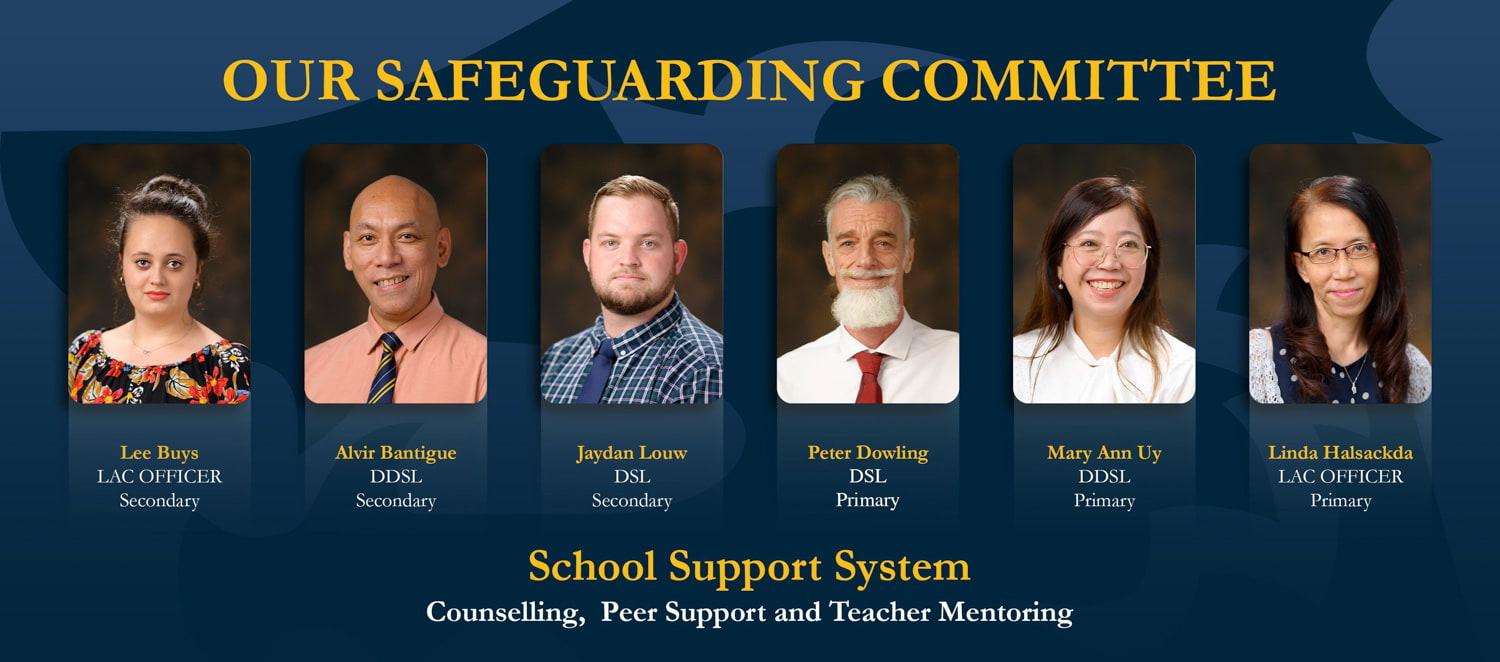Safeguarding
Our safeguarding policy and procedures aim to prevent and respond to
harm, abuse, and neglect. All our staff are committed to creating a
safe environment. They receive comprehensive training and guidance
and are aware of their responsibilities.
This includes:
- clear procedures to follow when there are concerns about a child
- providing support to individuals who have experienced harm or are at risk
- following a structured process for investigating concerns and allegations
- the sharing of information
We have two safe-guarding teams, one focusing on and supporting Early Years and Primary children and the other on Secondary school pupils. Our designated safeguarding leads (DSL) and deputies (DDSL) undertake further tuition to deepen their skills and understanding.

At HISV we take safe-guarding and child protection very seriously. Every child has the right to feel free from discrimination and any form of neglect, violence or harassment. They deserve to grow up in a safe, peaceful, nurturing and enabling environment where they can fully exercise their rights to grow and thrive.
Our Wellbeing curriculum supports our vision of developing compassionate members of society, who can navigate a complex world with a sense of purpose, knowing they have the skills to look after themselves and others, to form and maintain meaningful relationships, and be alert to dangers.
Wellbeing Curriculum
There is compelling evidence that higher levels of wellbeing can lead to better educational outcomes. The Global Happiness Policy Report 2018 states that,
“Schools are the primary place where the values of a culture get instilled in young people… To the extent that [if] teachers transmit optimism, trust, and a hopeful sense of the future, this will positively influence their students’ perception of the world.”
An uncertain future means that pupils today need solid foundations of resilience to go into adulthood with confidence. And the link between increased wellbeing and resilience is clear:
“Positive student wellbeing was associated with a higher proportion of resilient students.”
(PISA, 2019)
The Wellbeing curriculum is designed to teach pupils and teachers the skills of wellbeing and show them how to apply these in everyday life. It is an inclusive and practical programme where the concepts of Growth Mindset and Mindfulness are central to its approach.
Taking Care of the Body
In this strand, we will learn how the body and mind are interrelated, and how taking care of our bodies helps us to take care of our overall wellbeing. We also learn about the brain, focusing on neuroplasticity, and why it is important to understand that intelligence is not a fixed characteristic, but can be developed.
Taking Care of the Mind
Children will learn that our thoughts, feelings and emotions affect our how we see the world, and understand that our minds need looking after in the same way that our bodies do. They will be introduced to skills such as mindfulness, which can help us to train our minds, develop resilience, and respond skillfully in stressful situations.
Taking Care of Relationships
Pupils will learn that a fundamental aspect of a happy life is developing positive relationships, and understand this in the context of our tribal past. The curriculum will also cover how to communicate more effectively with people, how to grow and maintain friendships and relationships with family, and how to navigate through life online in a healthy and sustainable way.
Taking Care of the World
Our pupils will learn that having a clear sense of purpose is about knowing what is important to them and being consciously part of something bigger than themselves. They will reflect on what brings them joy, understand that they have strengths that they can develop, and start to think about their aspirations and set goals. They will also reflect on the meaning of community and how they can positively contribute to the people and the world around them.

Lessons are conducted in a nicely decorated Wellbeing room, allowing for a calm and relaxed atmosphere.
Pastoral Care
Our pastoral Care Officer (PCO) focuses on and supports the well-being of students, addressing barriers to learning and ensuring a safe and inclusive environment. The PCO is also a member of the school’s safeguarding team. Acting as a mentor and counsellor, the PCO is here to help empower pupils to make informed life choices and support children who are struggling with behaviour or emotional issues. The PCO, in collaboration with teachers and senior management, plans and prepares for our annual Inclusion Week where pupils focus on understanding, accepting and celebrating differences. Each year we have different focus points, e.g., race, religion, age, sex, disability or gender. All our staff work to promote understanding and respect, and ensure that all pupils feel they are valued members of our school community. Being unique is normal!
Behaviour
All our teaching staff supervise pupils to stay on task by providing a supportive but well-disciplined environment. Class rules are discussed and established at the beginning of the year. They aim to ensure children can learn in a safe environment where respect, goodwill and compassion can flourish. We deal promptly with conflict and incidents in line with our established behaviour policy. At HISV, we believe in the concept of work for positive change, helping pupils understand how their behaviour affects themselves, others, and their own reputation. By working for positive change, pupils can contribute to a better world, whether it's in our school, their future workplace or the community. We encourage pupils to take responsibility for their own behaviour.
Health and Safety
Our Health & Safety Officer (HSO) ensures the school premises are safe and secure. They walk through the school every morning. Senior management also inspect the school grounds regularly. Outside contractors service our fire alarms and equipment, making sure all is ready in the event of an emergency.